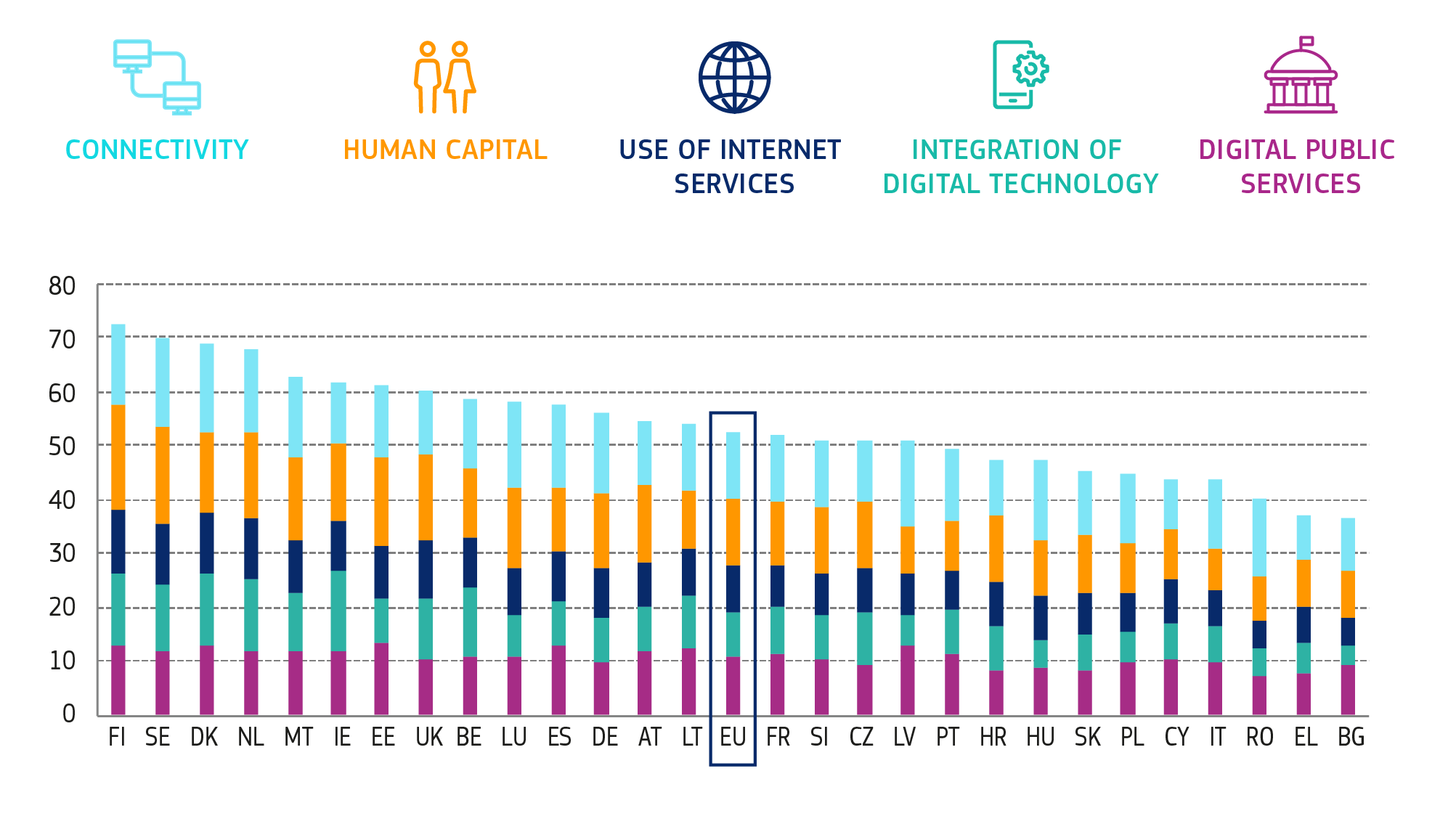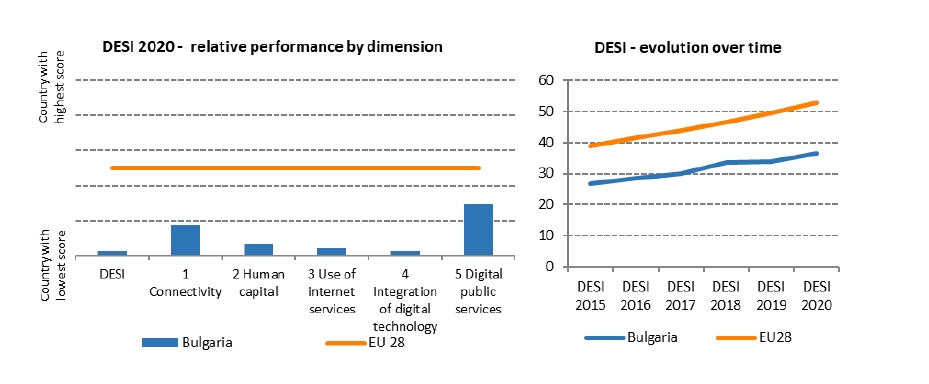With Improved Performance in Almost All Indicators, Bulgaria Still Lags in the Digital Economy and Society Index

Bulgaria has made significant improvements in e-government, with rising numbers of users and a high score in providing digital public services for business. Still, the country ranks last among the 28 EU Member States in the European Commission’s digital economy and society index (DESI) for 2020.
DESI monitors Europe’s overall digital performance and tracks the progress of EU countries in digital competitiveness. The index includes European analysis, reports by area, as well as country reports for all Member States.
The DESI index includes 5 dimensions:
- Connectivity – fixed broadband take-up, fixed broadband coverage, mobile broadband and broadband prices
- Human capital – internet user skills and advanced skills
- Use of internet – citizens’ use of internet services and online transactions
- Integration of digital technology – business digitisation and e-commerce
- Digital public services – e-Government
Bulgaria’s performance by area
Between 2015 – 2020, Bulgaria has improved its performance in almost all indicators. But, although its overall score has risen to 36.4, it now ranks lower than before on the basis of data prior to the pandemic. This is because the country has not performed particularly well on some DESI indicators, where EU peers have improved their performance.

With an overall Connectivity score of 38.5, Bulgaria ranks 26th among EU countries. Fast broadband coverage (NGA) improved from 75% in 2018 to 77% in 2019 and VHCN coverage from 38% in 2018 to 42% in 2019. Bulgaria still has a gap to fill in fixed broadband network deployment to reach the EU average. It ranks at the bottom of the list in overall broadband take-up with 58% households subscribing and 25th on take-up of high-speed fixed broadband of at least 100 Mbps, with only limited progress year after year: from 7% in 2017, 10% in 2018 and 11% in 2019.
The mobile broadband indicators, on the contrary, are relatively good, having further improved average 4G coverage from 72% in 2017, to 80% in 2018 and to 81% in 2019, with a high take-up steadily increasing from 87 subscriptions per 100 people in 2017, to 98 in 2018 and 103 subscriptions per 100 people in 2019. This places Bulgaria slightly above the EU average. Bulgaria ranks 10th in the broadband price index with prices lower than the EU average mainly for fixed services.
Bulgaria ranks 26th out of 28 EU countries in Human capital, having climbed two steps up from 2019. Nevertheless, its score of 33.9% remains well below the EU average of 49%. The overall level of basic digital skills in Bulgaria is among the EU’s lowest. People with at least basic digital skills account for 29% of the total Bulgarian population aged 16 to 74, against an EU average of 58%. Only 11% of people have above basic skills, equivalent to a third of the EU average. ICT specialists now account for 3% of total employment marking an increase, although this figure remains a small proportion of the workforce given the labour market shortages. Female ICT specialists account for 1.8% of total employment, slightly above the EU average.
Bulgaria continues to rank 27th in the Use of internet services with an overall score well below the EU’s: 67% of Bulgarians use the internet against an EU average of 85%, while 24% have never used it – the highest level of non-use in the EU. Bulgarian internet users make more use of video calls than users elsewhere in the EU. They are also well above the EU average when it comes to social network activities (78% vs 65%). 66% of internet users read news online, a figure which is below the EU average. Bulgarian internet users are less keen to use other online services, especially online banking. Although use of e-banking has risen slightly, only 13% of internet users take advantage of it compared with the EU average of 66%. Only 31% of internet users shop online, against an EU average of 71%.
Bulgaria ranks 28th among EU countries on the Integration of digital technology, well below the EU average. Bulgarian companies struggle to take advantage of the opportunities offered by online commerce: only 7% of SMEs sell online (against 18% of the EU average), 3% of total SMEs sell cross-border, and only 2% of their turnover comes from the online segment. Although Bulgarians make intensive use of social media for personal purposes, only 10% of firms use it to promote their business, against an EU average of 25%. Finally, firms with a high intensity index account for only 10.9% of the total. On a more positive note, 23% of businesses share information online against an EU average of 34%.
Although Bulgaria has made some progress on Digital public services, it remains 23rd with a score of 62. The number of e-government users has stagnated since the previous year, with 61% of internet users submitting forms online, close to the EU average of 67%. The outdated legal framework remains the major obstacle to its widespread use.
Bulgaria continues to perform well in providing digital public services for businesses where it scores 96%, well above the EU average of 89%. However, the number of e-government users has stalled at last year’s level with 61% of internet users submitting forms online. The gap with the EU average which has climbed to 67%, has thus widened a bit.
Download the full country report.
About DESI 2020
The Digital Economy and Society Index (DESI) monitors Europe’s overall digital performance and tracks the progress of EU countries in digital competitiveness. By providing data on the state of digitisation of each Member State, it helps them identify areas requiring priority investment and action.
The DESI 2020 reports are based on 2019 data and assess the status of the digital economy and society prior to the pandemic. The current crisis is having an important impact on key societal indicators, relating to the use of internet services by citizens.
Over the past year, all EU countries improved their digital performance. Finland, Sweden, Denmark and the Netherlands scored the highest ratings in DESI 2020 and are among the global leaders in digitalisation. These countries are followed by Malta, Ireland and Estonia. Some other countries, however, still have a long way to go, and the EU needs improvement to be able to compete on the global stage.
The European Analysis 2020, as well as all six DESI Area Reports, are available for download here.
